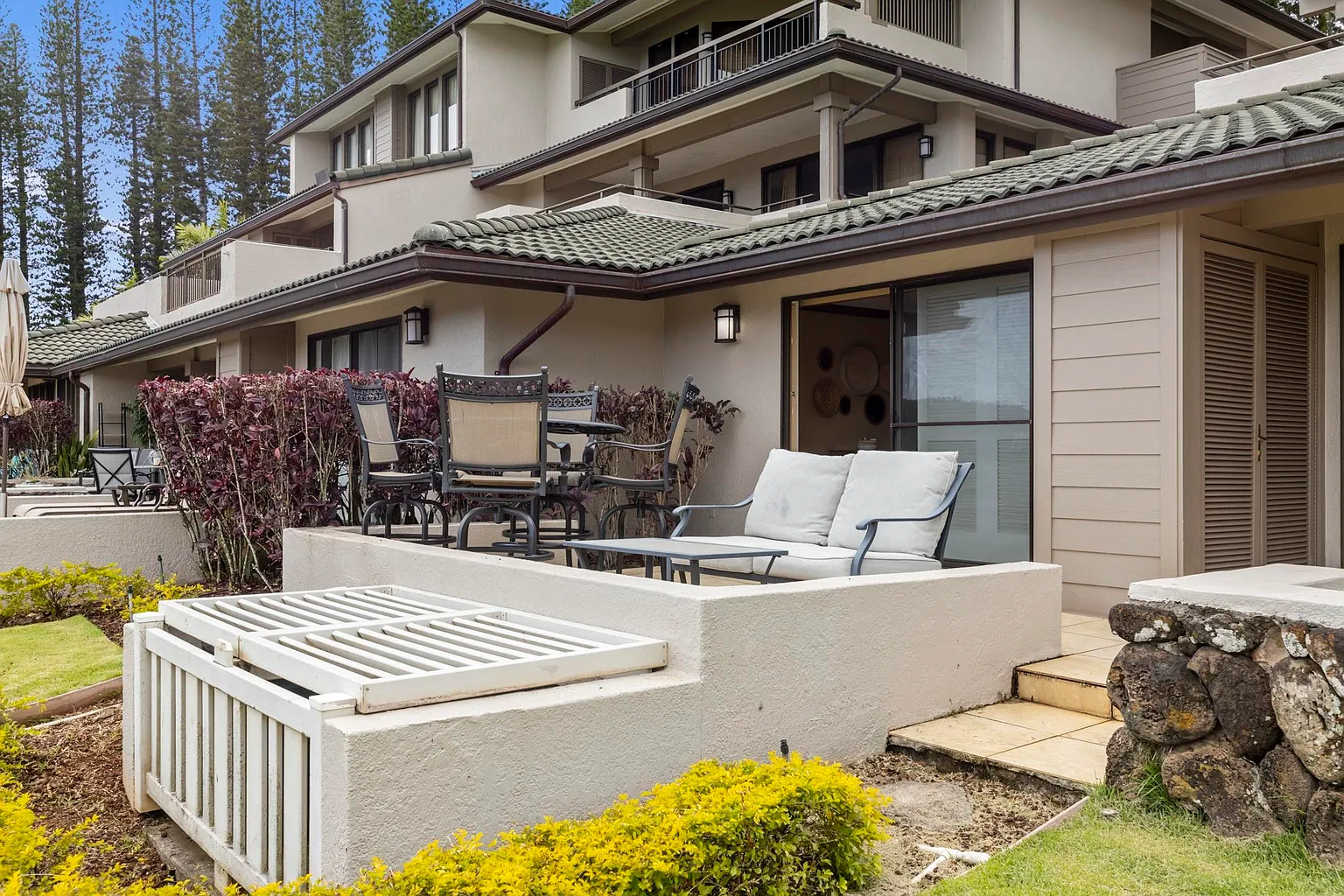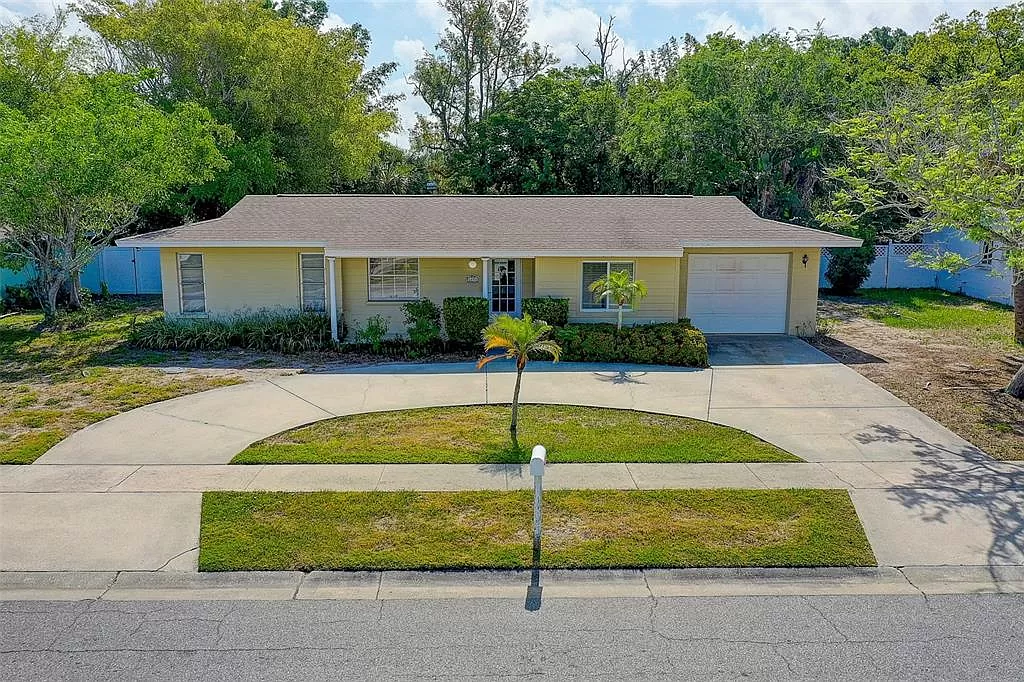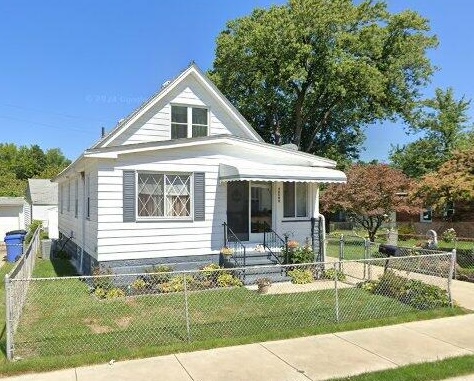Editorial Integrity
Making informed real estate decisions starts with having the right knowledge. At HomeAbroad, we offer US mortgage products for foreign nationals & investors and have a network of 500+ expert HomeAbroad real estate agents to provide the expertise you need. Our content is written by licensed mortgage experts and seasoned real estate agents who share insights from their experience, helping thousands like you. Our strict editorial process ensures you receive reliable and accurate information.
As of [January, 2026], HomeAbroad’s DSCR loan interest rates typically range from 6.12% to 6.62%. Actual rates vary based on factors such as DSCR ratio, loan-to-value (LTV), property type, and overall deal structure.
Interest rates play a critical role in the true cost and performance of a DSCR loan. Even small differences in pricing can significantly impact monthly cash flow, long-term returns, and overall investment profitability, especially for income-focused real estate investors.
In our experience underwriting DSCR loans for real estate investors, understanding why rates differ matters just as much as knowing the rate itself. Factors like rental income strength, property cash flow, and risk profile often determine whether an investor lands at the lower or higher end of the rate range.
In this guide, we break down current DSCR loan interest rates, explain what drives them, and show how they can affect you as an investor.

Pre-qualify for a DSCR Loan in a Few Clicks.
No Paystubs, W2s, or Tax Returns Required.
Table of Contents
Current DSCR Loan Interest Rates [January, 2026]
Based on HomeAbroad’s current DSCR pricing, as of [January, 2026], 30-year fixed DSCR rates can start around 6.125% for well-qualified scenarios.
For foreign national investors, rates typically fall in the 6.75% to 7.25% range, reflecting the additional risk considerations tied to cross-border lending.
To be clear, these figures represent baseline ranges. Actual rates can move higher or lower depending on factors like property cash flow strength, DSCR coverage, LTV, property type, and overall risk profile of the investment.
DSCR Loan Interest Rates vs Conventional Mortgage Rates
DSCR loan rates are typically higher than conventional mortgage rates because DSCR underwriting relies more heavily on property income, execution, and investor-specific risk factors than borrower W-2 income and standard agency guidelines.
DSCR rates are typically higher because the underwriting focus is different. DSCR loans qualify primarily on the property’s rental income, and pricing reflects cash flow strength, leverage, Property Use, and execution risk rather than agency-style income documentation.
The honest answer is that rates matter, but they are rarely the deciding factor on their own. When the deal works on fundamentals and the DSCR cushion is real, rate timing becomes secondary.

Steven Glick,
Director of Mortgage Sales, HomeAbroad NMLS# 1231769
Instead of waiting, you can start building equity in your property. If market rates move lower later, refinancing may be an option, subject to eligibility, property performance, and loan terms.
Before moving forward, the key is running the numbers against your investment strategy. When the deal works on fundamentals, interest rate timing becomes secondary.
How DSCR Loan Interest Rates Are Calculated
The honest answer is DSCR loan interest rates are not fixed. When we underwrite DSCR loans to investors, we adjust the rates based on a combination of property performance, deal structure, and overall risk profile. Understanding these factors helps investors position their deals more effectively and qualify for better pricing.
Below are the key factors that shape DSCR loan interest rates.
1. DSCR Ratio
The Debt Service Coverage Ratio (DSCR) measures how well a property’s rental income covers its debt obligations. It is calculated by dividing the property’s gross rental income by its total monthly or annual debt payments, including PITIA (principal, interest, taxes, insurance, and HOA fees).
For example,
Monthly Rent: $10,000
Monthly PITIA: $8,333.33
DSCR = $10,000 / $8,333.33, which brings DSCR ratio to 1.2.
This number means the property generates 20% more income than its total debt obligations.
A DSCR of 1 or higher is required for a DSCR loan, as it shows sufficient income to cover the mortgage and other necessary expenses.
In our experience structuring DSCR loans, the DSCR ratio affects both approval and pricing. The reason this matters is simple: higher coverage gives the lender more cushion against vacancies, expense spikes, or softer rent. Properties with stronger DSCR typically qualify for pricing closer to the lower end of the rate range, while thinner coverage often leads to pricing adjustments, tighter terms, or a larger down payment to bring the risk back into balance.
To get a quick estimate of your own property’s ratio, you can use our DSCR calculator and see how it may influence the rates you qualify for.
Here is a representation of how DSCR loan rates are adjusted with different DSCR ratios.
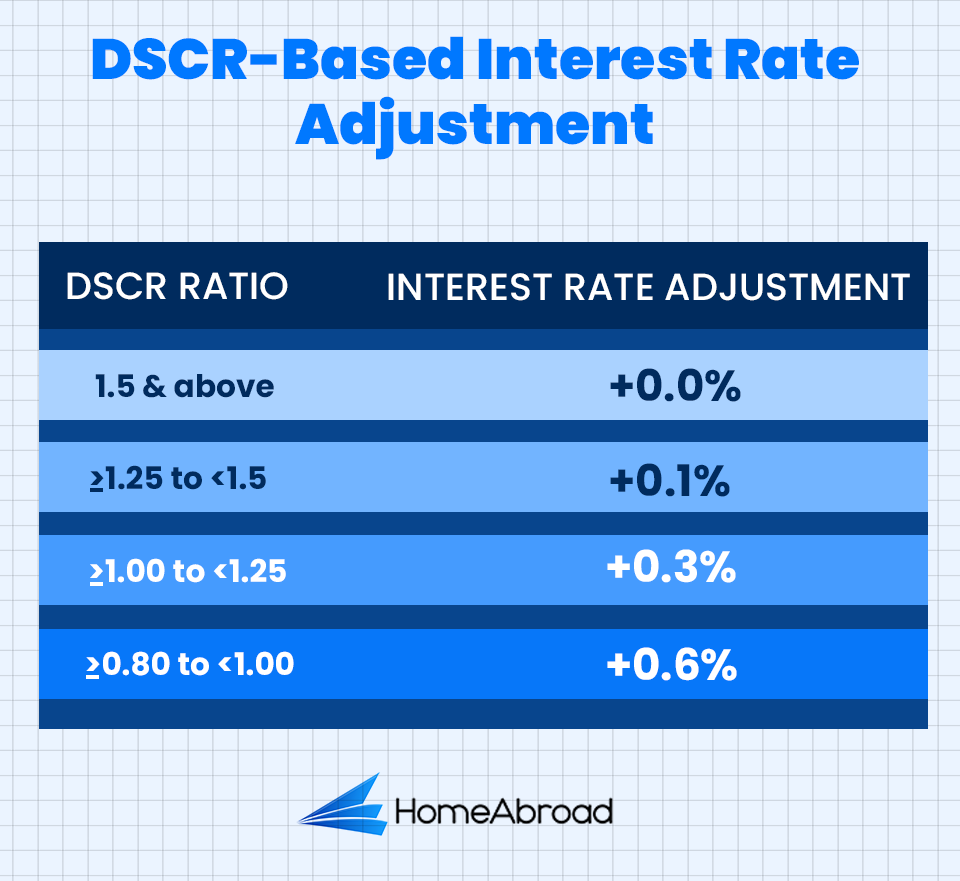
2. Credit Score
While DSCR loans are qualified based on a property’s rental income rather than personal income, credit history is still reviewed as part of the overall risk assessment.
A stronger credit profile generally supports more competitive pricing, while lower scores may result in rate adjustments that can often be offset with higher equity or stronger cash flow.
At HomeAbroad, we offer DSCR loans for foreign national investors that do not require a US credit history. With our 15+ years of DSCR lending, we focus more on the strength of the rental income, DSCR ratio, and deal structure rather than relying solely on traditional credit benchmarks.

Pre-qualify for a DSCR Loan in a Few Clicks.
No Paystubs, W2s, or Tax Returns Required.
Here is a tabular representation of how different credit score ranges and LTV affect interest rates. The table below shows the rate adjustments based on credit score and LTV. For example, if your credit score is 700 and the LTV is 70%, we will increase the base rate by 0.5%.
Note that this table is just an estimate, and the actual adjustment may vary.
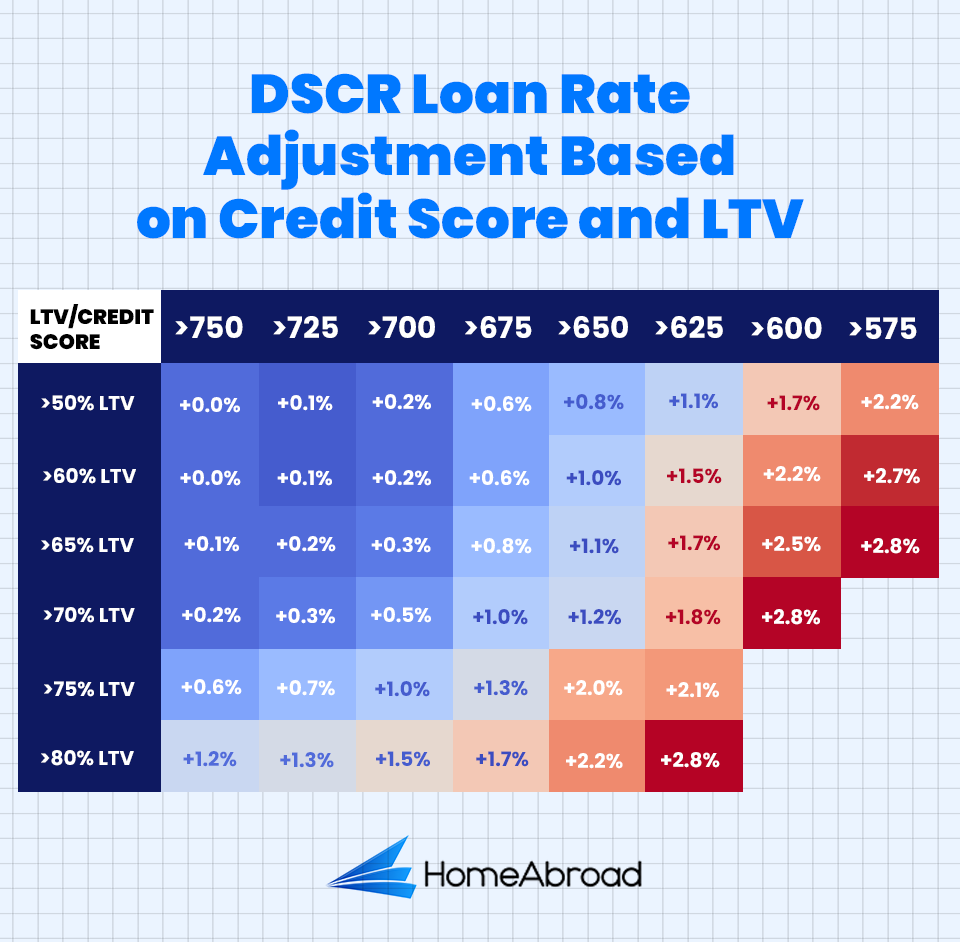
While there is a minimum credit score requirement of 620 for DSCR loan qualification for domestic clients, international real estate investors do not need US credit score, income, or tax returns.
3. LTV (Loan-to-Value)
The Loan-to-Value (LTV) ratio shows the percentage of a property that is financed through borrowing.
For example, an 80% LTV ratio means you borrowed 80% of the property’s purchase price and paid 20% of the down payment.
Technically speaking, lower LTVs reduce risk by increasing equity in the property, which often results in more competitive interest rates. Higher LTVs carry more risk and typically lead to pricing increases.
Down payment strategy is one of the most effective levers investors can control when aiming for better DSCR loan terms.
4. Investor Experience
This is no financial metric, but an important one that we consider during DSCR loan application evaluation. A proven track record often signals that an investor understands how to operate rental properties, manage expenses, and stabilize income over time.
A pattern we’ve noticed is that experienced investors tend to move through underwriting faster because they understand documentation, insurance timing, and how rental income is assessed. That familiarity can reduce friction in the process, even though it doesn’t replace the need for a qualifying DSCR.
To be clear, prior investing experience is not mandatory to qualify for a DSCR loan. We regularly work with first-time investors who close successfully as long as the rental income, DSCR ratio, and deal structure meet our guidelines.
5. Short-term Rentals/Airbnb
Short-term rental properties generate less predictable income due to seasonality, occupancy swings, and local competition. That variability makes our income projections more difficult and increases the overall risk profile.
The reason this matters is that when income is less consistent, we have to price for that uncertainty. Higher risk doesn’t just affect interest rates. It can also translate into higher reserve requirements or additional down payment to offset volatility.
Based on our internal pricing and recent executions, short-term rental DSCR scenarios can price higher than comparable long-term rentals. That spread reflects the added uncertainty in projecting stable cash flow over the life of the loan, especially in seasonal markets. To be clear, the exact difference varies by documentation method, leverage, and coverage strength, so we size each file to the property’s actual income durability rather than a best-case rent assumption.
The trade-off is straightforward. Short-term rentals may offer higher gross revenue, but the increased borrowing costs and stricter underwriting assumptions need to be factored into the overall return to determine whether the strategy makes sense for the deal.
6. Mortgage Type
The structure of a DSCR loan also affects the interest rate. Common DSCR mortgage types include:
7. Refinance
Refinance and cash-out DSCR loans typically price slightly higher than purchase loans. The adjustment is usually around 0.2%.
This rate increase is mainly due to the higher risk associated with refinancing, particularly cash-out options. In such cases, we extend additional credit based on the property’s equity, thereby increasing their risk exposure.
These factors help shape your final DSCR loan interest rates. Rethink your borrowing strategy based on these factors to secure lower interest rates.
At HomeAbroad, we structure DSCR loans around the way you actually plan to run the asset. We review the property’s rent profile, PITIA, reserves, and your hold timeline so the loan terms fit the strategy, not the other way around. The process is fully online, and you work directly with a dedicated mortgage officer from initial sizing through closing and any future refinance planning.
Hear from our client Liam and Emma Thompson, a Canadian couple who bought a Hawaiian Rental Property, about how we helped them.
Despite having no US credit history, HomeAbroad guided us to the perfect DSCR loan, allowing us to invest in a stunning property in Lahaina. The process was smooth, and the rental income is covering our mortgage. We couldn’t be happier with their expert support and highly recommend them to any foreign national looking to invest in the US.
Liam and Emma Thompson, Lahaina, Hawaii
You may come across DSCR loan offers advertising very low interest rates. Don’t rush into a decision. In DSCR financing, the headline rate alone rarely reflects the true cost or suitability of the loan for your investment strategy.
What to Look for When Comparing DSCR Loan Interest Rates
When comparing DSCR loan options, it’s important to evaluate the full structure of the loan, not just the interest rate. Small differences in terms can have a meaningful impact on cash flow, flexibility, and long-term returns.
Here are the key factors to review:
From what we see most often with real estate investors, the headline rate rarely determines whether the deal is a long-term win. The distinction is in the execution details: points and lender fees, how the prepay is structured, and how reliably the loan closes on schedule. The formula looks simple, but those line items can move real cash flow and change your exit playbook, especially if you plan to refinance or sell within the first few years.
When we structure DSCR loans at HomeAbroad, we review each deal beyond just the rate. Our loan experts evaluate rental income strength, leverage, reserve requirements, and how the loan fits the investor’s broader strategy, especially for foreign nationals investing in the US for the first time.
This approach helps real estate investors move forward with clarity, confidence, and financing that aligns with how they actually invest in US real estate.
Ready to get started? Apply for a DSCR loan with HomeAbroad and get the best loan terms tailored to your investment goals today.

Pre-qualify for a DSCR Loan in a Few Clicks.
No Paystubs, W2s, or Tax Returns Required.
Frequently Asked Questions
Is the DSCR loan worth the higher interest rate?
DSCR loans allow investors to qualify based on the property’s income rather than their personal income. These loans offer great flexibility and the ability to finance multiple properties simultaneously, making them worth considering despite the higher rates.
Why are DSCR loan interest rates higher than those of conventional loans?
DSCR loans are priced around property income strength, leverage, and execution risk, not W-2 underwriting and agency guidelines. That difference in underwriting approach can translate into different pricing.
Can I buy down the rate on a DSCR loan?
Yes, you can buy down the rate on a DSCR loan. Paying discount points is one common way to reduce the interest rate in exchange for higher upfront costs.
Are DSCR loan interest expenses deductible for rental property owners?
The IRS generally allows mortgage interest deductions as a rental expense, subject to your specific facts and tax situation. Review IRS guidance and consult a qualified tax professional for your case.



![DSCR Loan Interest Rates Today [January, 2026]](https://homeabroadinc.com/wp-content/uploads/2022/09/dscr-loan-interest-rates-500x325.png)





![DSCR Loans Guide for Foreign Nationals: What It Is & How to Apply in [2026]](https://homeabroadinc.com/wp-content/uploads/2022/06/dscr-loan-guide-FN.png)
![DSCR Loan Down Payment Requirements [2026]](https://homeabroadinc.com/wp-content/uploads/2023/01/DSCR-loan-down-payment.png)
